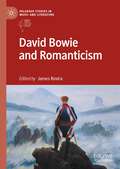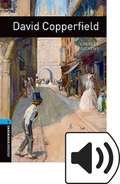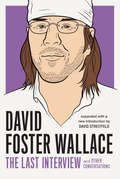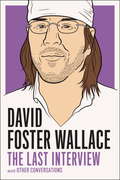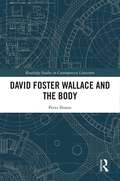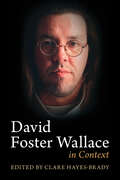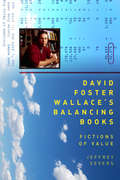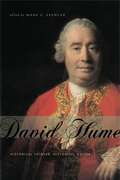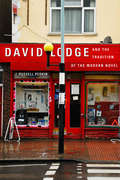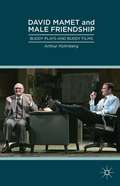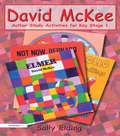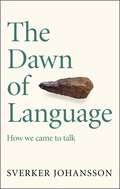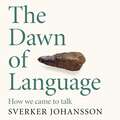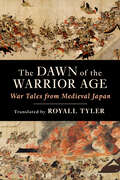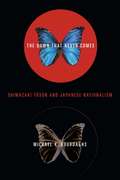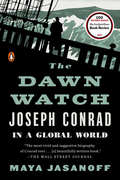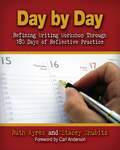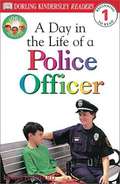- Table View
- List View
David Bowie and Romanticism (Palgrave Studies in Music and Literature)
by James RoviraDavid Bowie and Romanticism evaluates Bowie’s music, film, drama, and personae alongside eighteenth- and nineteenth-century poets, novelists, and artists. These chapters expand our understanding of both the literature studied as well as Bowie’s music, exploring the boundaries of reason and imagination, and of identity, gender, and genre. This collection uses the conceptual apparata and historical insights provided by the study of Romanticism to provide insight into identity formation, drawing from Romantic theories of self to understand Bowie’s oeuvre and periods of his career. The chapters discuss key themes in Bowie’s work and analyze what Bowie has to teach us about Romantic art and literature as well.
David Copperfield
by Charles Dickens Clare WestThis award-winning collection of adapted classic literature and original stories develops reading skills.
David Foster Wallace: and Other Conversations (The Last Interview Series)
by David Streitfeld David Foster WallaceAn expanded edition featuring new interviews and an introduction by the editor, a New York Times journalist and friend of the authorA unique selection of the best interviews given by David Foster Wallace, including the last he gave before his suicide in 2008. Complete with an introduction by Foster Wallace's friend and NY Times journalist, David Streitfeld. And including a new, never-before-published interview between Streitfeld and Wallace.
David Foster Wallace: and Other Conversations (The Last Interview Series)
by David Foster WallaceIn intimate and eloquent interviews, including the last he gave before his suicide, the writer hailed by A.O. Scott of The New York Times as "the best mind of his generation" considers the state of modern America, entertainment and discipline, adulthood, literature, and his own inimitable writing style.In addition to Wallace's last interview, the volume features a conversation with Dave Eggers, a revealing Q&A with the magazine of his alma mater Amherst, his famous Salon interview with Laura Miller following the publication of Infinite Jest, and more.These conversations showcase and illuminate the traits for which Wallace remains so beloved: his incomparable humility and enormous erudition, his wit, sensitivity, and humanity. As he eloquently describes his writing process and motivations, displays his curiosity by time and again turning the tables on his interviewers, and delivers thoughtful, idiosyncratic views on literature, politics, entertainment and discipline, and the state of modern America, a fuller picture of this remarkable mind is revealed.
David Foster Wallace and the Body (Routledge Studies in Contemporary Literature)
by Peter SloaneDavid Foster Wallace and the Body is the first full-length study to focus on Wallace’s career-long fascination with the human body and the textual representation of the body. The book provides engaging, accessible close readings that highlight the importance of the overlooked, and yet central theme of all of this major American author’s works: having a body. Wallace repeatedly made clear that good fiction is about what it means to be a ‘human being’. A large part of what that means is having a body, and being conscious of the conflicts that arise, morally and physically, as a result; a fact with which, as Wallace forcefully and convincingly argues, we all desire ‘to be reconciled’. Given the ubiquity of the themes of embodiment in Wallace’s work, this study is an important addition to an expanding field. The book also opens up the themes addressed to interrogate aspects of contemporary literature, culture, and society more generally, placing Wallace’s works in the history of literary and philosophical engagements with the brute fact of embodiment.
David Foster Wallace in Context (Literature in Context)
by Clare Hayes-BradyDavid Foster Wallace is regarded as one of the most important American writers of the twentieth and twenty-first centuries. This book introduces readers to the literary, philosophical and political contexts of Wallace's work. An accessible and useable resource, this volume conceptualizes his work within long-standing critical traditions and with a new awareness of his importance for American literary studies. It shows the range of issues and contexts that inform the work and reading of David Foster Wallace, connecting his writing to diverse ideas, periods and themes. Essays cover topics on gender, sex, violence, race, philosophy, poetry and geography, among many others, guiding new and long-standing readers in understanding the work and influence of this important writer.
David Foster Wallace's Balancing Books: Fictions of Value
by Jeffrey SeversThe writing of David Foster Wallace transformed the root and branch of contemporary fiction, introducing a formal inventiveness that moved authors away from an emotionless postmodern irony. Critics have pointed to Wallace’s exploration of morality and a return to sincerity as the central concerns of his work. However, as Jeffrey Severs argues in David Foster Wallace’s Balancing Books, the author was also deeply engaged with the social, political, and economic issues of the twentieth and twenty-first centuries. A rebellious economic thinker, Wallace not only satirized the deforming effects of money but also questioned the logic of the monetary system. In his original readings of all of Wallace’s fiction, from The Broom of the System and Infinite Jest to the story collections and The Pale King, Severs reveals Wallace to be a thoroughly political writer whose works provide an often surreal history of financial crises and neoliberal policies.As Severs demonstrates, balance and value are crucial to the work of Wallace, who constantly asks us to consider what we value and why. The concept of value is where his major interests intersected: economics, work, metaphysics, mathematics, and morality. Severs also details how Wallace’s writing explores the quest for balance in a world of excess and entropy. Wallace showed characters struggling to place two feet on the ground and restlessly sought to balance the books of a chaotic culture. Explaining why Wallace’s work has galvanized a new phase in contemporary global literature, Severs draws connections to key forerunners Don DeLillo, Thomas Pynchon, and William Gaddis, as well as successors-including Dave Eggers, Teddy Wayne, Jonathan Lethem, and Zadie Smith-interpreting Wallace’s legacy in terms of finance, the gift, and office life.
David Foster Wallace's Balancing Books: Fictions of Value
by Jeffrey SeversWhat do we value? Why do we value it? And in a neoliberal age, can morality ever displace money as the primary means of defining value? These are the questions that drove David Foster Wallace, a writer widely credited with changing the face of contemporary fiction and moving it beyond an emotionless postmodern irony. Jeffrey Severs argues in David Foster Wallace's Balancing Books that Wallace was also deeply engaged with the social, political, and economic issues of the twentieth and twenty-first centuries. A rebellious economic thinker, Wallace satirized the deforming effects of money, questioned the logic of the monetary system, and saw the world through the lens of value's many hidden and untapped meanings. In original readings of all of Wallace's fiction, from The Broom of the System and Infinite Jest to his story collections and The Pale King, Severs reveals Wallace to be a thoroughly political writer whose works provide an often surreal history of financial crises and economic policies.As Severs demonstrates, the concept of value occupied the intersection of Wallace's major interests: economics, work, metaphysics, mathematics, and morality. Severs ranges from the Great Depression and the New Deal to the realms of finance, insurance, and taxation to detail Wallace's quest for balance and grace in a world of excess and entropy. Wallace showed characters struggling to place two feet on the ground and restlessly sought to "balance the books" of a chaotic culture. Explaining why Wallace's work has galvanized a new phase in contemporary global literature, Severs draws connections to key Wallace forerunners Don DeLillo, Thomas Pynchon, and William Gaddis, as well as his successors—including Dave Eggers, Teddy Wayne, Jonathan Lethem, and Zadie Smith—interpreting Wallace's legacy in terms of finance, the gift, and office life.
David Hume: Historical Thinker, Historical Writer
by Mark G. SpencerThis volume provides a new and nuanced appreciation of David Hume as a historian. Gone for good are the days when one can offhandedly assert, as R. G. Collingwood once did, that Hume “deserted philosophical studies in favour of historical” ones. History and philosophy are commensurate in Hume’s thought and works from the beginning to the end. Only by recognizing this can we begin to make sense of Hume’s canon as a whole and see clearly his many contributions to fields we now recognize as the distinct disciplines of history, philosophy, political science, economics, literature, religious studies, and much else besides. Casting their individual beams of light on various nooks and crannies of Hume’s historical thought and writing, the book’s contributors illuminate the whole in a way that would not be possible from the perspective of a single-authored study.Aside from the editor, the contributors are David Allan, M. A. Box, Timothy M. Costelloe, Roger L. Emerson, Jennifer Herdt, Philip Hicks, Douglas Long, Claudia M. Schmidt, Michael Silverthorne, Jeffrey M. Suderman, Mark R. M. Towsey, and F. L. van Holthoon.
David Hume: Historical Thinker, Historical Writer
by Mark G. SpencerThis volume provides a new and nuanced appreciation of David Hume as a historian. Gone for good are the days when one can offhandedly assert, as R. G. Collingwood once did, that Hume “deserted philosophical studies in favour of historical” ones. History and philosophy are commensurate in Hume’s thought and works from the beginning to the end. Only by recognizing this can we begin to make sense of Hume’s canon as a whole and see clearly his many contributions to fields we now recognize as the distinct disciplines of history, philosophy, political science, economics, literature, religious studies, and much else besides. Casting their individual beams of light on various nooks and crannies of Hume’s historical thought and writing, the book’s contributors illuminate the whole in a way that would not be possible from the perspective of a single-authored study.Aside from the editor, the contributors are David Allan, M. A. Box, Timothy M. Costelloe, Roger L. Emerson, Jennifer Herdt, Philip Hicks, Douglas Long, Claudia M. Schmidt, Michael Silverthorne, Jeffrey M. Suderman, Mark R. M. Towsey, and F. L. van Holthoon.
David Lodge and the Tradition of the Modern Novel
by J. Russell PerkinDavid Lodge is a much-loved novelist and influential literary critic. Examining his career from his earliest publications in the late 1950s to his more recent works, David Lodge and the Tradition of the Modern Novel identifies Lodge's central place within the canon of twentieth-century British literature. J. Russell Perkin argues that liberalism is the defining feature of Lodge's identity as a novelist, critic, and Roman Catholic intellectual, and demonstrates that Graham Greene, James Joyce, Kingsley Amis, Henry James, and H.G. Wells are the key influences on Lodge's fiction. Perkin also considers Lodge's relationship to contemporary British novelists, including Hilary Mantel, Julian Barnes, and Monica Ali. In a study that is both theoretically informed and accessible to the general reader, Perkin shows that Lodge's work is shaped by the dialectic of modernism and the realist tradition. Through an approach that draws on diverse theories of literary influence and history, David Lodge and the Tradition of the Modern Novel provides the most thorough treatment of the novelist's career to date.
David Lodge and the Tradition of the Modern Novel
by J. Russell PerkinDavid Lodge is a much-loved novelist and influential literary critic. Examining his career from his earliest publications in the late 1950s to his more recent works, David Lodge and the Tradition of the Modern Novel identifies Lodge's central place within the canon of twentieth-century British literature. J. Russell Perkin argues that liberalism is the defining feature of Lodge's identity as a novelist, critic, and Roman Catholic intellectual, and demonstrates that Graham Greene, James Joyce, Kingsley Amis, Henry James, and H.G. Wells are the key influences on Lodge's fiction. Perkin also considers Lodge's relationship to contemporary British novelists, including Hilary Mantel, Julian Barnes, and Monica Ali. In a study that is both theoretically informed and accessible to the general reader, Perkin shows that Lodge's work is shaped by the dialectic of modernism and the realist tradition. Through an approach that draws on diverse theories of literary influence and history, David Lodge and the Tradition of the Modern Novel provides the most thorough treatment of the novelist's career to date.
David Mamet and Male Friendship
by Arthur HolmbergUsing insights from psychology, sociology, anthropology, and the history of sexuality, Holmberg explores the ambiguity that drives male bonding. Personal interviews with Mamet and with the actors who have interpreted his major roles shed light on how and why men bond with each other and complement close analysis of Mamet's texts.
David McKee: Author Study Activities for Key Stage 1 (A Health Care for Women International Publication)
by Sally EldingThis innovative series is designed to help primary teachers plan focused sessions on the work of popular, well-loved and valued authors, both classic and contemporary. Each book contains a range of activities for use directly in the classroom, covering biographical information about the author; a review of the author's work and a summary of major themes in his/her key texts; key language features of the author; frameworks to help children analyze, evaluate and compare texts, and to develop personal opinions of authors' works; ideas for writing modeled on or developed from key texts; speaking and listening opportunities; drama and role play ideas; and references to video, CD-ROM, websites and ICT activities. Inside each book is a full-color pullout poster illustrating the work of the author, which also has a set of challenges for children on the back. David McKee is an author and illustrator, creator of Mr Benn, King Rollo, and the ever-popular patchwork elephant, Elmer. Building on children's enjoyment of the characters and their adventures, this book presents activities that focus on narrative structure, character development, settings and themes. Most importantly, the activities are designed to make learning about stories as much fun as reading them. Games and activities include: fortunately/unfortunately and chain of events - exploring cause and effect; comparing plots - using a matrix to order information; looking for clues about Elmer - building a character sketch; mapping feelings - exploring character development; time talk and Isabel's diary - understanding setting, sequence and relationships between the two; making a story map - recognizing picture and context clues; comparing the video to the written text; and text detective work using extracts.
The Dawn of Language: The story of how we came to talk
by Sverker Johansson"A model of popular-science writing" STEVEN POOLEWho was "the first speaker" and what was their first message?An erudite, tightly woven and beautifully written account of one of humanity's greatest mysteries - the origins of language.Drawing on evidence from many fields, including archaeology, anthropology, neurology and linguistics, Sverker Johansson weaves these disparate threads together to show how our human ancestors evolved into language users. The Dawn of Language provides a fascinating survey of how grammar came into being and the differences or similarities between languages spoken around the world, before exploring how language eventually emerged in the very remote human past.Our intellectual and physiological changes through the process of evolution both have a bearing on our ability to acquire language. But to what extent is the evolution of language dependent on genes, or on environment? How has language evolved further, and how is it changing now, in the process of globalisation? And which aspects of language ensure that robots are not yet intelligent enough to reconstruct how language has evolved? Johansson's far-reaching, authoritative and research-based approach to language is brought to life through dozens of astonishing examples, both human and animal, in a fascinatingly erudite and entertaining volume for anyone who has ever contemplated not just why we speak the way we do, but why we speak at all.Translated from the Swedish by Frank Perry
The Dawn of Language: The story of how we came to talk
by Sverker JohanssonAn erudite, tightly woven and beautifully written account of one of humanity's greatest mysteries - the origins of language.Who was "the first speaker" and what was their first message?Drawing on evidence from many fields, including archaeology, anthropology, neurology and linguistics, Sverker Johansson weaves these disparate threads together to show how our human ancestors evolved into language users. The Dawn of Language provides a fascinating survey of how grammar came into being and the differences or similarities between languages spoken around the world, before exploring how language eventually emerged in the very remote human past.Our intellectual and physiological changes through the process of evolution both have a bearing on our ability to acquire language. But to what extent is the evolution of language dependent on genes, or on environment? How has language evolved further, and how is it changing now, in the process of globalisation? And which aspects of language ensure that robots are not yet intelligent enough to reconstruct how language has evolved? Johansson's far-reaching, authoritative and research-based approach to language is brought to life through dozens of astonishing examples, both human and animal, in a fascinatingly erudite and entertaining volume for anyone who has ever contemplated not just why we speak the way we do, but why we speak at all.Sverker Johansson's claim to fame otherwise is to have invented the LSJBot, which has written 8% of all articles on Swedish Wikipedia. He is also a physicist, has conducted research at CERN and participated in EVOLANG, a leading international research conference on language.TRANSLATED FROM THE SWEDISH BY FRANK PERRY(P) 2021 Quercus Editions Limited
The Dawn of Language: The story of how we came to talk
by Sverker Johansson"A model of popular-science writing" STEVEN POOLEWho was "the first speaker" and what was their first message?An erudite, tightly woven and beautifully written account of one of humanity's greatest mysteries - the origins of language.Drawing on evidence from many fields, including archaeology, anthropology, neurology and linguistics, Sverker Johansson weaves these disparate threads together to show how our human ancestors evolved into language users. The Dawn of Language provides a fascinating survey of how grammar came into being and the differences or similarities between languages spoken around the world, before exploring how language eventually emerged in the very remote human past.Our intellectual and physiological changes through the process of evolution both have a bearing on our ability to acquire language. But to what extent is the evolution of language dependent on genes, or on environment? How has language evolved further, and how is it changing now, in the process of globalisation? And which aspects of language ensure that robots are not yet intelligent enough to reconstruct how language has evolved? Johansson's far-reaching, authoritative and research-based approach to language is brought to life through dozens of astonishing examples, both human and animal, in a fascinatingly erudite and entertaining volume for anyone who has ever contemplated not just why we speak the way we do, but why we speak at all.Translated from the Swedish by Frank Perry
The Dawn of the Warrior Age: War Tales from Medieval Japan
by Royall TylerThe war between the Heike and Genji clans in the twelfth and thirteenth centuries is among the most compelling and significant moments in Japan’s history, immortalized in The Tale of the Heike. Beyond the events recorded in this canonical text, the conflicts of the surrounding years are crucial to medieval Japanese culture and history. In 1156, power began to slip away from the court nobility in Kyoto. A shogunate was later founded in Kamakura, and in 1221, it won a decisive victory over the court.The three war tales translated in this book tell the story of these critical decades, vividly recording stages in the passage from rule by the imperial court in Kyoto to rule by the warrior government in Kamakura. “The Tale of the Hōgen Years” recounts a deposed emperor’s disastrous attempt to regain the throne in 1156. “The Tale of the Heiji Years” narrates a bloody clash between rival courtier factions in 1159. “An Account of the Jōkyū Years” records Kamakura’s victory over the imperial attempt to overthrow it in 1221. These works do not simply complete the story of The Tale of the Heike—they are classics of Japanese literature in their own right. Royall Tyler’s lively translation masterfully conveys the nature of medieval Japanese warfare, rendering aristocratic power politics and the brutal realities of violence with equal aplomb. The Dawn of the Warrior Age is an essential book for readers interested in premodern Japanese history and literature.
The Dawn That Never Comes: Shimazaki Toson and Japanese Nationalism (Studies of the Weatherhead East Asian Institute, Columbia University)
by Michael BourdaghsA critical rethinking of theories of national imagination, The Dawn That Never Comes offers the most detailed reading to date in English of one of modern Japan's most influential poets and novelists, Shimazaki Toson (1872–1943). It also reveals how Toson's works influenced the production of a fluid, shifting form of national imagination that has characterized twentieth-century Japan. Analyzing Toson's major works, Michael K. Bourdaghs demonstrates that the construction of national imagination requires a complex interweaving of varied—and sometimes contradictory—figures for imagining the national community. Many scholars have shown, for example, that modern hygiene has functioned in nationalist thought as a method of excluding foreign others as diseased. This study explores the multiple images of illness appearing in Toson's fiction to demonstrate that hygiene employs more than one model of pathology, and it reveals how this multiplicity functioned to produce the combinations of exclusion and assimilation required to sustain a sense of national community. Others have argued that nationalism is inherently ambivalent and self-contradictory; Bourdaghs shows more concretely both how this is so and why it is necessary and provides, in the process, a new way of thinking about national imagination. Individual chapters take up such issues as modern medicine and the discourses of national health; ideologies of the family and its representation in modern literary works; the gendering of the canon of national literature; and the multiple forms of space and time that narratives of national history require.
The Dawn That Never Comes: Shimazaki T son and Japanese Nationalism
by Michael BourdaghsA critical rethinking of theories of national imagination, The Dawn That Never Comes offers the most detailed reading to date in English of one of modern Japan's most influential poets and novelists. This book surveys the ideologies of national imagination at play in early-twentieth-century Japan, specifically in the work of Shimazaki Toson (1872-1943). Bourdaghs analyzes Toson's major works in detail, using them to demonstrate that the field of national imagination requires a complex interweaving of varied--and sometimes even contradictory--figures for imagining the national community.
The Dawn Watch: Joseph Conrad in a Global World
by Maya Jasanoff“Enlightening, compassionate, superb” —John Le CarréA visionary exploration of the life and times of Joseph Conrad, his turbulent age of globalization and our own, from one of the most exciting young historians writing todayMigration, terrorism, the tensions between global capitalism and nationalism, and a communications revolution: these forces shaped Joseph Conrad’s destiny at the dawn of the twentieth century. In this brilliant new interpretation of one of the great voices in modern literature, Maya Jasanoff reveals Conrad as a prophet of globalization. As an immigrant from Poland to England, and in travels from Malaya to Congo to the Caribbean, Conrad navigated an interconnected world, and captured it in a literary oeuvre of extraordinary depth. His life story delivers a history of globalization from the inside out, and reflects powerfully on the aspirations and challenges of the modern world. Joseph Conrad was born Józef Teodor Konrad Korzeniowski in 1857, to Polish parents in the Russian Empire. At sixteen he left the landlocked heart of Europe to become a sailor, and for the next twenty years travelled the world’s oceans before settling permanently in England as an author. He saw the surging, competitive "new imperialism" that planted a flag in almost every populated part of the globe. He got a close look, too, at the places “beyond the end of telegraph cables and mail-boat lines,” and the hypocrisy of the west’s most cherished ideals. In a compelling blend of history, biography, and travelogue, Maya Jasanoff follows Conrad’s routes and the stories of his four greatest works—The Secret Agent, Lord Jim, Heart of Darkness, and Nostromo. Genre-bending, intellectually thrilling, and deeply humane, The Dawn Watch embarks on a spell-binding expedition into the dark heart of Conrad’s world—and through it to our own.
A Day at the Beach: A Grammar Tales Book to Support Grammar and Language Development in Children (Grammar Tales)
by Jessica HabibPete, Jem and Belle are enjoying a day at the beach until the weather turns stormy. Targeting Subject-Verb-Object sentences and early adjectives, this book provides repeated examples of early developing syntax and morphology which will engage and excite the reader while building pre-literacy skills and make learning fun, as well as exposing children to multiple models of the target grammar form. Perfect for a speech and language therapy session, this book is an ideal starting point for targeting client goals and can also be enjoyed at school or home to reinforce what has been taught in the therapy session.
Day by Day: Refining Writing Workshop Through 180 Days of Reflective Practice
by Ruth Ayres Stacey ShubitzHave you ever wanted your own personal writing coach to help improve your teaching of writing? How about two personal writing coaches? In Day by Day, Stacey Shubitz and Ruth Ayres, creators of the popular blog Two Writing Teachers, guide you through the trials and tribulations of a whole year of writing workshop. ' Day by Day is organized around six fundamental components of writing workshoproutines, mini-lessons, choice, mentors, conferring, and assessment. Each component is broken down into ten-day sections. Each section includes a detailed discussion, a challenge that teachers can apply immediately,' and questions to help teachers assess the process to see what went right, what went wrong, and, most importantly, why.' Ruth and Stacey also provide daily encouragement, support, practical strategies, tips, advice, and everything you need to run an effective writing workshop that meets the needs of all the different writers in your classroom.
A Day In The Country: An Alphabet Story
by Liza AlexanderThis is a lively alphabet book featuring the Sesame Street characters. The Sesame Street gang go to the countryside. While there they entertain themselves by searching for things that start with the letters of the alphabet.
A Day in the Life of a Police Officer (Darling Kindersley Readers )
by Linda HaywardThe duties of police officers are simply explained to young readers in this book that features short sentences, simple vocabulary, word repetition, and visual clue to help readers learn new words.
